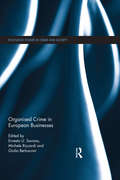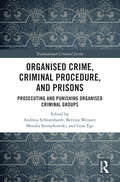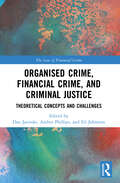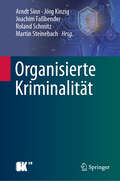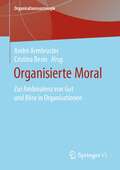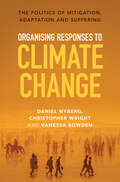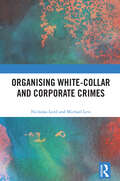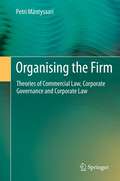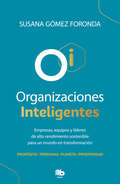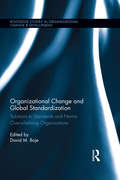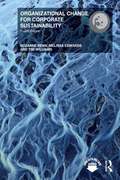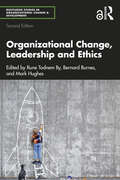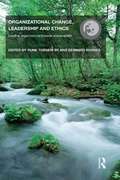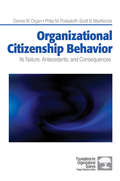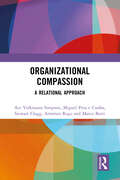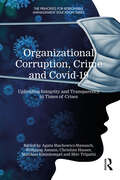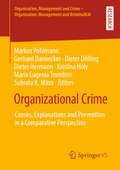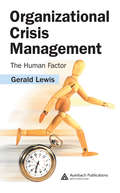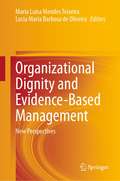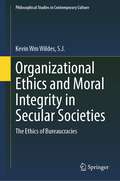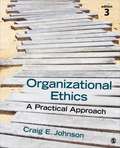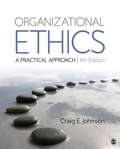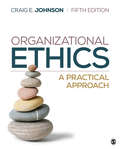- Table View
- List View
Organised Crime in European Businesses (Routledge Studies in Crime and Society)
by Ernesto U. Savona Michele Riccardi Giulia BerlusconiThe infiltration of organised crime in the legitimate economy has emerged as a transnational phenomenon. This book constitutes an unprecedented study of the involvement of criminal groups in the legitimate economy and their infiltration in legal businesses, and is the first to bridge the research gap between money laundering and organised crime. It analyses the main drivers of this process, explaining why, how and where infiltration happens. Building on empirical evidence from the Netherlands, Slovenia, Spain, Sweden, the UK, Ireland, Italy, France and Finland, Organised Crime in European Businesses is divided into four parts. Part I explores the infiltration of legitimate businesses to conceal and facilitate illicit trafficking. Part II examines the infiltration of legitimate businesses to develop fraud schemes. Part III focuses on the infiltration of legitimate businesses to control the territory and influence policy makers. Part IV concludes by considering the research and policy implications in light of these findings. Bringing together leading experts and detailed case studies, this book considers the infiltration of organised crime in legitimate business around Europe. It is an ideal resource for students and academics in the fields of criminology, economics and sociology, as well as private sector practitioners, public officials and policy makers.
Organised Crime, Criminal Procedure, and Prisons: Prosecuting and Punishing Organised Criminal Groups (Transnational Criminal Justice)
by Andreas Schloenhardt, Bettina Weisser, Monika Stempkowski, and Gian EgeThis book explores a range of topics relating to the prosecution and trial of organised crime and the punishment, especially imprisonment, of members of organised criminal groups. Organised crime poses particular challenges to the criminal justice system. While much of the attention of policy-makers, legislators, law enforcement, and the media is on criminalisation and investigation, much less attention, including academic analysis, has been devoted to the unique problems posed by organised crime to criminal procedure and to the prison system. This book gives particular attention to the role and powers of prosecutors and the judiciary, measures relating to criminal proceedings, international cooperation, sentencing, and the situations in prisons. The book is intended to be a valuable guide for academics, researchers and policy-makers working in the areas of organised crime, international criminal justice, criminal procedures, and prisons.
Organised Crime, Financial Crime, and Criminal Justice: Theoretical Concepts and Challenges (The Law of Financial Crime)
by Dan Jasinski, Amber Phillips, and Ed JohnstonOrganised crime and financial crime are pressing global problems, increasingly recognised as policy priorities both by national governments and international bodies and corporations. This proudly interdisciplinary collection is built on the premise that these topics are too often artificially separated, both in scholarship and the classroom. Bringing together scholars from law, the social sciences, and the humanities, this book showcases a diverse range of perspectives on these complex and compelling global issues, and the criminal justice challenges that they pose. The themes discussed include legal theory and procedure; regulation and enforcement; prevention and punishment; media representation and perception. Readers are encouraged to think outside traditional disciplinary bounds and form their own connections and conclusions inspired by the juxtaposition of perspectives rarely seen together in the same volume.
Organisierte Kriminalität: Systematische Analyse der Phänomenbereiche und mögliche staatliche Reaktionen
by Arndt Sinn Roland Schmitz Martin Steinebach Jörg Kinzig Joachim FaßbenderDas Werk befasst sich mit dem Phänomen "Organisierte Kriminalität" (OK), das neben politisch motivierter Kriminalität und dem Terrorismus ein beherrschendes Thema in der deutschen und europäischen Kriminalpolitik und im öffentlichen Diskurs ist. Allerdings ist es der (Rechts-) Wissenschaft bislang nur unzureichend gelungen, das Phänomen der OK systematisch und umfassend zu analysieren, das Gefahrenpotenzial der organisierten Gruppierungen ganzheitlich darzustellen, die sich daraus ergebenden Herausforderungen für die Strafverfolgungsbehörden hinreichend zu beschreiben und nachhaltig wirksame Strafverfolgungsstrategien zur Bekämpfung der OK vorzuschlagen. Das Buch verfolgt das Ziel, eine Forschungslücke zur Organisierten Kriminalität zu schließen, indem eine ganzheitliche und systematische Analyse des Phänomenbereichs „OK“ unter Einbeziehung von Polizei- und Justizpraxis unternommen wird. Der Forschungsverbund hat in verschiedenen Modulen Strukturen, Entwicklungsdynamiken und Wirkungsmechanismen sowie die rechtliche und praktische Bewältigung von Organisierter Kriminalität, die Entwicklung von IT-Werkzeugen zur Erkennung von Organisierter Kriminalität im Internet und des aus Organisierter Kriminalität resultierende Bedrohungspotenzials untersucht. Die gewonnenen Erkenntnisse sind in konkrete Handlungsempfehlungen für den Gesetzgeber und Entscheidungsträger eingeflossen, die am Ende des Bandes vorgestellt werden.
Organisierte Moral: Zur Ambivalenz von Gut und Böse in Organisationen (Organisationssoziologie)
by Cristina Besio André ArmbrusterDer Band untersucht, inwieweit moralisch gutes oder schlechtes Handeln organisiert werden kann. Die Diskussion soziologischer Erklärungen des normativ Guten und Bösen in und von Organisationen beleuchtet den ambivalenten Zusammenhang von Moral und Organisation, da Organisationen sowohl für moralische Anliegen eintreten als auch moralisch-ethische Normen (teilweise sogar absichtlich) verletzen. Diese Ambivalenz adressiert der Band durch theoretisch-konzeptionelle Beiträge sowie durch empirische Studien. Der Band zeigt damit die große Varietät in der empirischen Beobachtbarkeit und der sozialwissenschaftlichen Analyse der Moralität von Organisationen – ohne selbst für oder gegen Moral zu argumentieren.
Organising Responses to Climate Change: The Politics of Mitigation, Adaptation and Suffering
by Christopher Wright Daniel Nyberg Vanessa BowdenClimate change is the most important issue now facing humanity. As global temperatures increase, floods, fires and storms are becoming both more intense and frequent. People are suffering. And yet, emissions continue to rise. This book unpacks the activities of the key actors which have organised past and present climate responses – specifically, corporations, governments, and civil society organisations. Analysing three elements of climate change – mitigation, adaptation and suffering – the authors show how exponential growth of the capitalist system has allowed the fossil fuel industry to maintain its dominance. However, this hegemonic position is now coming under threat as new and innovative social movements have emerged, including the fossil fuel divestment movement, Fridays for Future, Extinction Rebellion and others. In exposing the inadequacies of current climate policies and pointing to the possibilities of new social and economic systems, this book highlights how the worst impacts of climate change can be avoided.
Organising White-Collar and Corporate Crimes
by Nicholas Lord Michael LeviThis book explores how we can re-constitute our approach to analysing and empirically investigating the organisation of white-collar and corporate crimes, with a view to building fuller theoretical and empirical accounts. The work demonstrates how knowledge can be produced and systematised within a conceptual and analytical framework concerned with understanding how such crimes are organised, why they are organised as they are, who gets involved in them as primary offenders and as facilitators, and the ‘real’ factors that shape these organisational dynamics over time in particular contexts and under varying conditions. In doing so, the book examines the distal (far-off) and proximal (close) social arrangements and relations that create and shape emergent white-collar crime opportunities and their structures. It also investigates the mechanisms, relationships, processes, and conditions that are necessary for the commission, or the unfolding, of white-collar crimes, or for their non-commission. How these are contingently connected to particular contexts is explored. The work also considers the people who collaborate, connect, and otherwise associate, whether ephemerally or for longer periods, in the pursuit of criminal goals and the actual or potential skills, expertise, and abilities of these people to accomplish or resist particular behaviours that are required of them. Finally, the book assesses the human, social, cultural, and material antecedents that enable white-collar crimes to flourish or fade. The work will be of particular interest to scholars theorising about and empirically investigating white-collar and corporate crimes, or seeking to understand empirical approaches to analysing such behaviours and other types of crime. It is primarily aimed at critical social scientists, including criminologists and sociologists, as well as socio-legal, business, economics, and political studies scholars. The work will also be of interest to practitioners and policymakers keen to learn more about how and why these crimes are organised as they are.
Organising the Firm: Theories of Commercial Law, Corporate Governance and Corporate Law
by Petri MäntysaariThe theoretical basis of commercial law, corporate governance law, and corporate law is still unsatisfactory. There essentially is no theory of commercial law, and existing theories of corporate governance and corporate law cannot explain the behaviour of firms or the contents of existing regulation. This book proposes a coordinated solution for all three areas. The starting point is that all three areas deal with the organisation of firms. Commercial law, corporate governance, and corporate law are therefore studied from the perspective of the firm rather than that of the judge or the investor. Changing the perspective makes it easier to formulate an "umbrella" theory of commercial law, and theories of corporate governance and corporate law as applications of the main theory. The book provides examples of how the proposed theories work by studying legal corporate governance tools and practices that increase the sustainability of the firm. Sustainability can be bolstered by making the governance model more self-enforcing and ensuring that it fosters innovation.
Organizaciones inteligentes
by Susana Gómez ForondaNuevos retos y nuevos modelos para una nueva era. Un libro imprescindible para directivos, mandos intermedios, consejeros y consultores comprometidos con emprender el camino del cambio inteligente. El mundo empresarial está enfrentándose a uno de los mayores desafíos de su historia. Las organizaciones que tendrán éxito en este siglo serán muy diferentes a las que lo tuvieron en el siglo XX. Por eso, es fundamental desarrollar un paradigma que responda de manera efectiva a los retos actuales y logre un alto rendimiento sostenible desde la perspectiva de «las 3 P»: planeta, personas y prosperidad financiera. Susana Gómez Foronda, experta reconocida a nivel internacional en cultura, liderazgo y talento, ha creado para ello el Modelo Organizaciones Inteligentes (OI), con el que aborda, en un lenguaje claro y con profundidad pragmática las grandes cuestiones de nuestro tiempo: ¿Qué es lo que hace que en una organización las cosas funcionen de manera excepcional? ¿Cómo desarrollar una organización inteligente? ¿Por qué es esencial reforzar de manera proactiva la cultura, el propósito y los valores? ¿Dónde has de poner el foco si quieres configurar un equipo de alto rendimiento? ¿Cuáles son las claves para elevar tu efectividad como líder en un contexto tan volátil y complejo? PROPÓSITO · PERSONAS · PLANETA · PROSPERIDAD
Organizational Change and Global Standardization: Solutions to Standards and Norms Overwhelming Organizations (Routledge Studies in Organizational Change & Development)
by David M. BojeOrganizational Change and Global Standardization: Solutions to Standards and Norms Overwhelming Organizations takes an organizational change approach to the overflow of standards and norms, looking at how to deal effectively and ethically with four kinds of standards and norms businesses face when they go global: (1) accounting & finance (2) international & world trade,(3) social and (4) safety & quality & environment. It is part of a larger problem faced by not only business, but every sort of organization - how to live with the epidemic of standards and norms, often in conflict, many just unnecessary, and a few that are quite helpful and important. There are good reasons to have International Standards Organization (ISO), International Labor Organization (ILO), World Trade Organization (WTO), North Atlantic Treaty Association (NAFTA), International accounting Standards Boards (IASB), International Financial Reporting Standards (IFRS)), and many more standard-setting organizations issuing, auditing, proposing codes of ethics, and certifying standards and norms. However, there are important, poorly understood organizational change consequences to the contagion of standards and norms. This volume brings together a unique group of authors who are working on a pragmatic way for organizations to deal with an overflow of standards and norms that are often at heads, ambiguous, or simply created to produce more work for a burgeoning standards setting industry. The aim of Organizational Change and Global Standardization is to stimulate a critical analysis within the framework of analytical and pragmatic approach to an overwhelming bureaucratization of the managed and organized global activities.
Organizational Change for Corporate Sustainability: A Guide For Leaders And Change Agents Of The Future (Understanding Organizational Change Ser.)
by Tim Williams Suzanne Benn Melissa EdwardsSince this classic book was first published in 2003, sustainability has increasingly been accepted as standard business practice for leading corporations, while the science itself has revealed how human activity has become the dominant force influencing irreversible changes in the planetary systems. The fourth edition of this trailblazing book on corporate sustainability provides new insights into how organizations can transition towards a more responsible way of conducting their business. It charts new thinking on value creation, business models and organizational purpose as the basis of a broader-based transition to a sustainable society. The sustainability phase model has been substantially revised to incorporate emergent approaches in sustainable supply chain management, strategic sustainability, sustainability-oriented innovation and new business models. There is a companion website that contains a range of materials to support learning. This new edition with the authors’ unified approach to sustainable business reshapes its plan of action to bring about corporate change by drawing in new management theory and practice on strategy-making and leadership, making it core reading for students and researchers of sustainability and business, organizational change and corporate social responsibility.
Organizational Change, Leadership and Ethics: Leading Organizations Towards Sustainability (Routledge Studies in Organizational Change & Development)
by Mark Hughes Rune Todnem By Bernard BurnesOrganizations and societies are facing extreme challenges that require action (IPCC, 2021). The UN's sustainability goals, demographic change, and the green shift are knocking on the door, while traditional education, and ways of leading and managing this development, often fail to keep up. Organizational Change, Leadership and Ethics challenges leadership orthodoxy, assumptions, and myths currently preventing the further development of theory and practice. It encourages intelligent disobedience in support of greater leadership capabilities and capacity in organisations and societies. As such, the book is written for everyone who wants to be MAD – to Make A Difference - students, scholars, and practitioners alike.
Organizational Change, Leadership and Ethics: Leading Organizations towards Sustainability (Routledge Studies in Organizational Change & Development)
by Rune Todnem By Bernard BurnesGiven recent financial crises and scandals, the rise of corporate social responsibility and the challenge of environmental sustainability, few would disagree that the role of ethics has taken centre stage in the management of organizations. In reality, however, organizations have found it extremely difficult to promote successful, ethical behaviour as this rarely results in short-term gains which can be appraised and rewarded. By and Burnes bring together leading international scholars in the fields of organizational change and leadership to explore and understand the context, theory and successful promotion of ethical behaviour in organizations. By focusing on real world examples, contributors analyze the issues and challenges that hinder ethical change leadership which can lead to sustainable organizations. This unique volume brings together the worlds of organizational change, leadership, business ethics and corporate social responsibility, resulting in a book that will be valuable reading in all four fields. With contributions from leading scholars, including David Boje, Dexter Dunphy, Suzanne Benn and Carl Rhodes, Organizational Change, Leadership and Ethics is a must-read.
Organizational Citizenship Behavior: Its Nature, Antecedents, and Consequences
by Dennis W. Organ Philip M. Podsakoff Scott Bradley MacKenzieOrganizational Citizenship Behavior: Its Nature, Antecedents, and Consequences examines the vast amount of work that has been done on organizational citizenship behavior (OCB) in recent years as it has increasingly evoked interest among researchers in organizational psychology. No doubt some of this interest can be attributed to the long-held intuitive sense that job satisfaction matters. Authors Dennis W. Organ, Philip M. Podsakoff, and Scott B. MacKenzie offer conceptual insight as they build upon the various works that have been done on the subject and seek to update the record about OCB.
Organizational Compassion: A Relational Approach
by Ace Volkmann Simpson Miguel Pina Cunha Stewart Clegg Arménio Rego Marco BertiOrganizational compassion provides a multitude of benefits at individual, team and organizational levels. These encompass heightened positive affect, trust, engagement, loyalty, performance, resilience, and recovery. This important book provides an accessible yet scholarly overview of key academic findings and theories on organizational compassion. It equips readers with tools for reflection, awakening and practical application of compassion within the workplace across dyadic, team and organizational contexts. Historically, compassion work has been largely unacknowledged in official organizational discourse. Yet, wherever there are human beings, there will be suffering; where there is human suffering, one can often find human responses infused with kindness and compassion. This observation holds true across industries, professions, and communities. The book explores the complexities of organizational compassion, analyzing the factors that enhance organizational compassion capabilities, as well as those that make compassion falter and fail. The primary aim of this book is to foster the cultivation of organizational compassion by providing a provocative, stimulating and engaging foray into the academic study of organizational compassion for readers, ranging from undergraduate to postgraduate and executive students, as well as reflective practitioners. In a world marked by suffering and challenges, a research-based understanding and fostering of compassion at work, offers a path towards a better future.
Organizational Corruption, Crime and Covid-19: Upholding Integrity and Transparency in Times of Crises (The Principles for Responsible Management Education Series)
by Agata Stachowicz-StanuschCorruption often flourishes in times of uncertainty and crisis. When institutions and oversight are weak, and public trust low, corruption can thrive and undermine how societies respond to the crisis. Covid-19 brought this issue into sharp focus, and this book uncovers some of the problems experienced across the globe and, crucially, explains how organizations and countries can strengthen their anti-corruption systems to prevent problems in the future.The book has been created by the members of the United Nations Principles for Responsible Management Education group on anti-corruption and brings together top international experts to consolidate the lessons from the Covid-19 crisis in order to improve transparency, integrity, trust, and governance in the future. Cybersecurity and cybercrime related to the pandemic are a particular focus. These factors are essential to social and economic order. Practice-oriented, each chapter offers examples of methods, approaches, tools, and cases which can be used for anti-corruption teaching, policy, and corporate initiatives.With insights and cases from right across the globe, the book will be of interest to NGOs, policymakers, organizational leaders, students, and researchers looking to foster accountability, integrity, and transparency across organizations in times of crisis.
Organizational Crime: Causes, Explanations and Prevention in a Comparative Perspective (Organization, Management and Crime - Organisation, Management und Kriminalität)
by Dieter Hermann Markus Pohlmann Subrata K. Mitra Kristina Höly Gerhard Dannecker Dieter Dölling Maria Eugenia TrombiniThis book presents the results of an international comparative study on the causes of rule deviation in business and medical organizations. Based on document and interview analyses as well as experiments, the discrepancy between (state) regulations and organizational practice is elaborated and discussed in an interdisciplinary perspective. On the basis of the distinction between organizational and individual deviance, it could be shown across national boundaries that the unwritten rules of the organization make a decisive contribution in explaining organizational wrongdoing, as well as their containment. Implications for effective prevention derived from this are also pointed out.
Organizational Crisis Management: The Human Factor
by Gerald LewisOrganizational Crisis Management: The Human Factor offers theoretical background and practical strategies for responding to workplace crises. Responding to a paradigm that focuses on the operational aspects of continuity to the detriment of human factors, this volume provides a comprehensive understanding of the unavoidable yet often complex reacti
Organizational Dignity and Evidence-Based Management: New Perspectives
by Maria Luisa Mendes Teixeira Lucia Maria Barbosa de OliveiraThis book discusses dignity in the organizational context. Combining diverse theoretical and methodological approaches, as well as empirical studies, this book examines the concept of dignity between organizations and a variety of stakeholders. Going beyond the traditional approach of the relationship between company and employees, and beyond the traditional perspective of human dignity in a Kantian or post-Kantian approach, this volume innovates by discussing dignity from different epistemic perspectives, bringing to the fore dignity, inserted in different organizational and cultural contexts. The volume is divided into five parts. The first part is dedicated to the concept of dignity in the organizational sphere (dignity inside organizations, dignity between organizations and their stakeholders, and dignity in business-to-business relationships) discussed under different epistemic approaches. The second part deals with dignity in the relationships between companies and employees. The third part deals with the relationship between companies and clients. The fourth part of the book studies business-to-business relationships, addressing the educational sector, restaurants, and microcredit. Finally, the fifth part focuses on the relationships between the organizational dignity construct and other constructs, such as stress, spirituality and trust. Opening new theoretical and methodological perspectives for the study of dignity, this book will be of use to researchers and students studying management, leadership, and business strategy, as well as management and HR professionals.
Organizational Ethics and Moral Integrity in Secular Societies: The Ethics of Bureaucracies (Philosophical Studies in Contemporary Culture #29)
by Kevin Wm Wildes, S.J.This book explores an undeveloped area in postmodern thought: organizational ethics. Ethical debates and analyses usually focus on a particular act or action, an actor, and/or how a secular society should address any of those particular persons or events. In the Post Modern age, ethical decisions and policies are characterized by moral and cultural pluralism. However, there is a second factor that complicates ethical and policy decisions even further. This book argues that in the postmodern age ethical decisions often need to be understood as part of the decision making of organizations and bureaucracies. Organizational decisions often have direct bearing on the choices made by individuals. Two areas that exemplify postmodern issue are the areas of health care and education. For example the decision making of Admissions Officers in American higher education, are influenced by decisions that have been made by the university about the size of the class and the diversity of the class. Health Care organizations make policy decisions that affect every aspect of a patient’s care from admission to treatment and the types of care that are or are not offered. Both education and health care are the object of the significant investment of resources, both areas are value laden in postmodern, pluralistic societies, and yet we do not have a comprehensive method to understand them or evaluate them. This book is of interest to bioethicists, physicians, nurses, health care policy students, educational policy experts, students and government regulators.
Organizational Ethics: A Practical Approach
by Craig E. JohnsonWe are constantly faced with ethical decisions, no matter what organizations we join. The ethical choices we make determine the health of our businesses, schools, government agencies, religious congregations, charities, and other institutions. Our ethical decisions also determine our career success or failure. Bestselling author, Craig E. Johnson, shows how we can develop our ethical competence, just as we develop our abilities to manage or oversee operations. Every chapter of Organizational Ethics: A Practical Approach, Third Edition provides readers with opportunities to apply ethical principles and practices in a variety of settings through self-reflection, analyses, projects, and discussion. Written in a reader-friendly style, each part of the book is layered around organizational behavior. The parts introduce moral theories used in ethical problem-solving; examines individual motivations; looks at the ethical dilemmas of groups, teams, and leaders as well as offers strategies for creating ethical cultures and promoting social responsibility. This book shows how readers can develop their ethical expertise and provides opportunities to practice problem-solving to defend their decisions.
Organizational Ethics: A Practical Approach
by Craig E. JohnsonWe are constantly faced with ethical decisions, no matter what organizations we join. The ethical choices we make determine the health of our businesses, schools, government agencies, religious congregations, charities, and other institutions. Our ethical decisions also determine our career success or failure. Bestselling author, Craig E. Johnson, shows how we can develop our ethical competence, just as we develop our abilities to manage or oversee operations. Every chapter of Organizational Ethics: A Practical Approach, Third Edition provides readers with opportunities to apply ethical principles and practices in a variety of settings through self-reflection, analyses, projects, and discussion. Written in a reader-friendly style, each part of the book is layered around organizational behavior. The parts introduce moral theories used in ethical problem-solving; examines individual motivations; looks at the ethical dilemmas of groups, teams, and leaders as well as offers strategies for creating ethical cultures and promoting social responsibility. This book shows how readers can develop their ethical expertise and provides opportunities to practice problem-solving to defend their decisions.
Organizational Ethics: A Practical Approach
by Craig E. JohnsonEvery industry must confront unethical behavior in the workplace. Whether your students want to pursue careers in business, education, public service, or the military, they will need a solid foundational understanding of ethics and the impact their decisions will have on their organizations and their own lives. Bestselling author, Craig E. Johnson, illustrates the best approaches for developing our ethical competence. Organizational Ethics: A Practical Approach equips students with the knowledge and skills they need to make a positive difference in their workplace. Self-assessments, reflection opportunities, and application projects allow students to practice their ethical reasoning abilities. Each part of the book focuses on a different aspect of ethical organizational behavior, examining ethics at the individual, group, and organizational levels. The revised Fourth Edition includes a new feature titled Contemporary Issues in Organizational Ethics and new case studies on current topics such as fake news, sexual harassment, and cultural appropriation. This book shows how readers can develop their ethical expertise and provides opportunities to practice problem-solving to defend their decisions.
Organizational Ethics: A Practical Approach
by Craig E. JohnsonEvery industry must confront unethical behavior in the workplace. Whether your students want to pursue careers in business, education, public service, or the military, they will need a solid foundational understanding of ethics and the impact their decisions will have on their organizations and their own lives. Bestselling author, Craig E. Johnson, illustrates the best approaches for developing our ethical competence. Organizational Ethics: A Practical Approach equips students with the knowledge and skills they need to make a positive difference in their workplace. Self-assessments, reflection opportunities, and application projects allow students to practice their ethical reasoning abilities. Each part of the book focuses on a different aspect of ethical organizational behavior, examining ethics at the individual, group, and organizational levels. The revised Fourth Edition includes a new feature titled Contemporary Issues in Organizational Ethics and new case studies on current topics such as fake news, sexual harassment, and cultural appropriation. This book shows how readers can develop their ethical expertise and provides opportunities to practice problem-solving to defend their decisions.
Organizational Ethics: A Practical Approach
by Craig E. JohnsonWith an interdisciplinary focus, Organizational Ethics equips students with the knowledge and skills they need to make a positive impact in a variety of workplaces. Author Craig E. Johnson builds the text around interdependent levels of organizational behavior, examining ethics at the individual, group, and organizational levels. Self-assessments, reflection features, and application projects give students ample opportunity to practice their ethical reasoning abilities. The Fifth Edition includes over 25 new case studies on current events and prominent figures, 24 new self-assessments, and new discussions on topics such as cross-cultural ethical conflict and organizational virtue.
